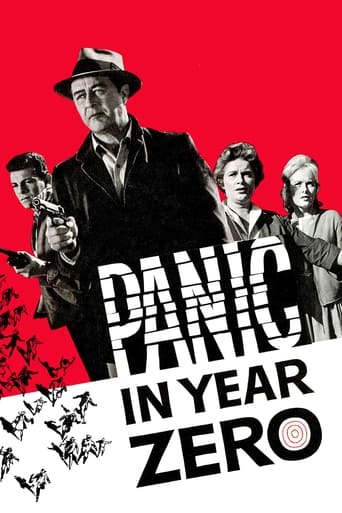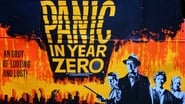Edgar Allan Pooh
. . . just as foretold by this flick that MGM (aka, "the Voice of America's Fat Cats") distributed decades ago. "Harry Baldwin" is a prototypical U.S. Fat Cat when he begins his murderous crime spree (featuring most of the other major felonies) during PANIC IN THE YEAR ZERO! As Harry progresses from armed robbery to assault and battery, continuing with blockade running, he teaches his two teen kids that MGM people should behave as if they're rulers of an Empire of One. Other folks exist only to be robbed if they have stuff you want, or murdered if they're in your way. Harry drives this point home by torching a busy interstate highway evacuation route, burning countless families to death in their cars, simply because the chicken Harry wishes to cross the road. Harry seems to have a thing about roadside mayhem, as he's soon instructing his son about bridge demolition. It's not long until Harry graduates to gunning down youths one by one, rather than simply burning anonymous families alive in their vehicles. The Trouble With Harry is that he seems to have no future. Harry tends to be in a constant state of PANIC IN THE YEAR ZERO! However, Harry's spiritual brother ran for U.S. President in 2016, and WON! Now we're all being entertained by seeing the whole USA being run as if it were an Empire for One!
hackraytex
I had never seen this movie until now but yes I was alive during this period and understand the fear and apprehension that we all felt with the drills of hiding under ours desks in school. During one of the drills as we were going under our desks, the teacher hid some of her favorites under a table. I saw a place open under a table and I scooted under there. Within a minute, she pulled me out by the leg and told me to get back under my desk. I guess she did not think I was as worthy to survive as her favorites were. I forgive her. Regarding Mr. Milland, his career did stall out since he was a victim of the "Oscar curse" that has befallen a lot of actors. He deserves respect that he picked himself up and did not let it stop him from working. A lot of people fail to realize with its prestige is acting is also a job and one has to feed their family and pay the bills. He did not sit home and pine for not getting good roles. Another actor whom I admire greatly is Eric Roberts who has about 500 movies to his credit. He must have a very good agent. He was once asked why he was doing work that appeared to be inferior to what he started with. He said that he did not get much work when he was holding out for the "good" parts. Ray Milland probably did some embarrassing work to kept the bills paid and the lights on. He later showed that he had a lot left in him with TV and miniseries performances. His is an example that any honest work is honorable. He had a very important part in Rich Man Poor Man. Good job and rest in peace Mr. Milland.
The point is that any honest work is honorable and should be respected. Good job and rest in peace Mr. Milland.
secondtake
Panic in Year Zero! (1962)The Baldwins are on their way camping in the California mountains when they see that L.A. has been hit by atomic bombs. That's the first exciting five minutes of the movie and the whole premise. What does an "ordinary" family do when the Soviets bomb us?Ray Milland is the dad, and he's good and forceful, taking on a father role with a combination of extreme resolve and civilized goodness. When I say extreme I mean that he's not always to civilized, and that's maybe the crux of the best of this movie—good people going bad. There is very little of what truly good people might do in this situation (I imagine there is a lot of generosity as well as panic and selfish survivalism). This was a fairly low budget affair, and B-movie king Roger Corman says that director Milland wasn't really up to the job, and it shows. It's often clumsy, and there is some awkward editing that must have come from lacking material in the three week shoot. It is, however, the most direct and sensational of the series of great films made in the early 60s about the coming of nuclear war ("On the Beach" is my favorite, but "Bedord Incident" and "Fail-Safe" are great, too, not to mention the singular "Dr. Strangelove.")The first third of this film is mostly about the actual panic, and it's not a bad rendition of the small towns and deluge of desperate people (and cars—lots of classics). The rest of the movie is the actual survival camping and the running into dangers in the wilderness (human ones) is a slow building of despair.Frankie Avalon, the singer, is a young star, and he's fine here. Mostly this is Milland's show, though, showing wisdom and authority in a male-dominant way that a bit tiring, even if the 60s were still a time where men were supposedly making the decisions (the truth was different, we know).The ending, which I won't give away, is an interesting take on the early 60s, and how our view of the government and the army have changed. At least for some people.A truly flawed movie with some truly interesting aspects that ill be interesting for decades to come.
gavin6942
A family of four leaves Los Angeles for a camping trip just before a nuclear bomb destroys the city. As lawlessness prevails, the father (Ray Milland) must fight to keep his family alive.There is something terribly disjointed about this film. The main cast (including Milland and Frankie Avalon) are great, but they are thrown in a world that does not know whether to worry or not. Right outside the city limits, people seem unable to comprehend that the loss of Los Angeles is bad, and no one panics. Yet, the farther out they get (where civilization is still intact), gangs of hoodlums and hooligans are kidnapping women... what? Les Baxter's score is actually a hindrance to the theme, because he provided nothing but upbeat jazzy riffs. As the world is facing nuclear war, Baxter is ready to party. This is no doubt one of the reasons the film is considered "campy". (In some ways, the music acts as a precursor to the beach party films Avalon would be doing within a couple years.) The lack of blood or even smoke from gunshots was sort of odd, because people would get hit with shotguns and just fall over. At one point, Milland even comments that Avalon has "lost a lot of blood" when the audience sees nothing -- not even torn clothes. There is something quaint and nostalgic about this, but also not very believable.The stand-out role was played by Joan Freeman as Marilyn Hayes, who was traumatized by the murder of her family and being kidnapped by hooligans. For 1962, this is something of a dark role. Not that her acting is incredible, but compared to everyone else...Paul Corupe finds the film to be important in a historical context. He believes the film "was the first to show that the survivors of a nuclear attack may not be as fortunate as you might think." He says that in contrast to bigger films like "On the Beach" (1959), this one "was among the first to play up the potential violence of the situation." Whether this is true or not I cannot say for sure, but assuming Corupe is right, the film deserves to be re-evaluated and possibly forgiven for its campy shortcomings.




